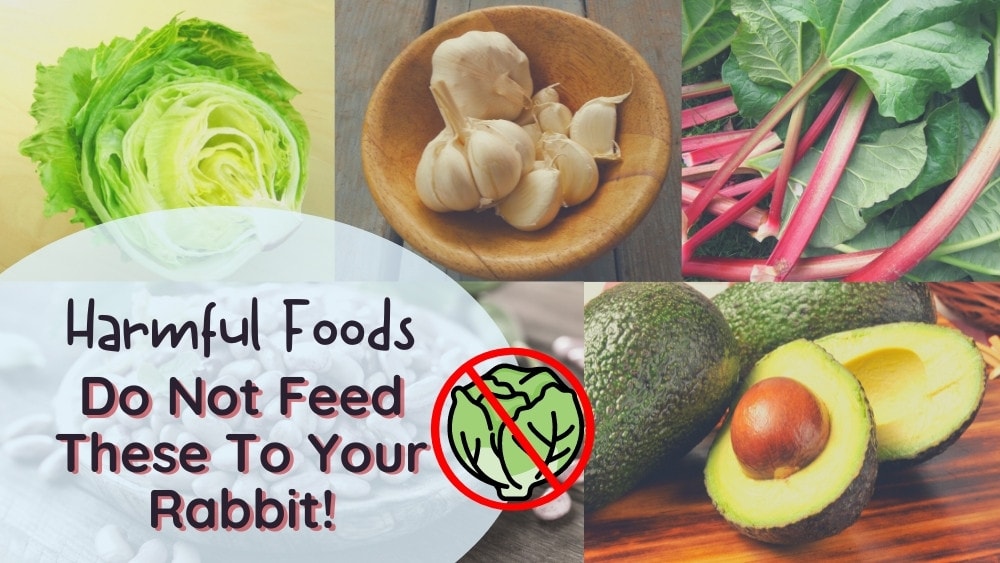Rabbits have a superpower: they can survive on 90% grass. Rabbits have highly specialized GI tracts built to break down and utilize every bit of nutrition in their roughage-rich diet.
But this superpower comes with a cost. Because of their unique digestive systems, there are many foods that rabbits can’t eat.
Many of the foods that humans enjoy will cause bloat, anaphylactic shock, or other life-threatening conditions in our long-eared friends.
In this article, we will look at foods you should not feed your rabbit.
What Can Rabbits Not Eat?
Rabbits should never eat avocado, alliums like onion and garlic, rhubarb, nightshade leaves, chocolate, or houseplants like snake plant or peace lily. These are toxic to rabbits and can kill them. Other major foods to avoid are grains, corn, beans, potatoes, iceberg lettuce, nuts, cereal, crackers, cookies, and yogurt drops.
Foods That Are Unsafe for Rabbits
Here’s a detailed list of foods that are poisonous for rabbits, or foods that rabbits can’t eat in large quantities without putting themselves at risk.
1. Iceberg Lettuce
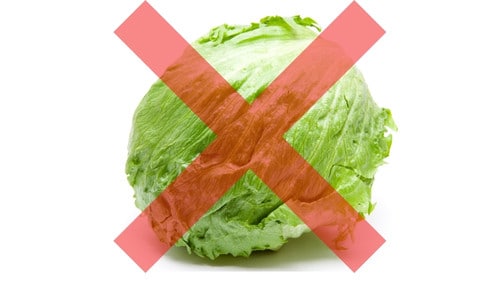
Despite the popular image of rabbits munching on garden lettuce, iceberg and other light-colored lettuces can cause loose stools if eaten in large quantities. This is due to its high water/low fiber ratio as well as a milky substance called lactucarium, found in lettuce stems and leaves.
Though lactucarium has a bitter flavor, it’s sometimes called “rabbit opium” because of its sedative effects. Your rabbit would happily eat iceberg lettuce, so it’s best to keep it out of reach. Instead offer him a bunny-safe salad built of romaine or darker-leafed lettuces.
2. Rhubarb
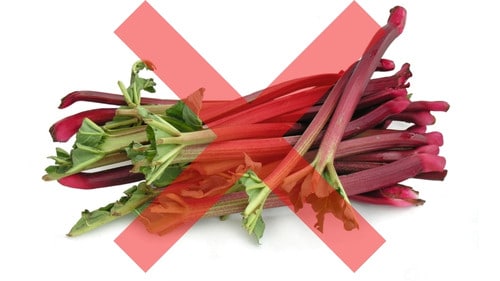
Rabbit’s can’t eat rhubarb due to its high concentration of oxalic acid. This antinutrient is found in higher concentrations in the leaves than in the stems, but all parts of the rhubarb plant are poisonous to rabbits. Oxalic acid interferes with calcium absorption and can cause kidney stones – a problem already too common in bunnies.
3. Allium Family
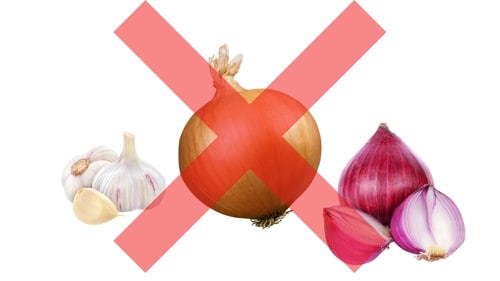
Rabbits should never eat onions or any other members of the allium family, including garlic, shallots, and leeks. These vegetables contain a toxic oxidant known as n-propyl disulfide that can lead to a loss of red blood cells when the body tries to eliminate it. Feeding onions to rabbits has also caused anaphylactic shock and death.
4. Avocado

While many fruits are safe for rabbits, avocado is not among them! Avocados are actually poisonous to rabbits. The peel, flesh, and seed of an avocado contains a chemical called persin, which can cause irregular heartbeat and even heart failure in rabbits.
5. Kidney Beans and Fava Beans

Avoid feeding your rabbit kidney beans, broad beans, soybeans, and other hard shelled beans. Not only are they high carbohydrate and high calcium, but they contain lectins that can irritate the intestines and reduce nutrient absorption.
6. Potatoes and Nightshades
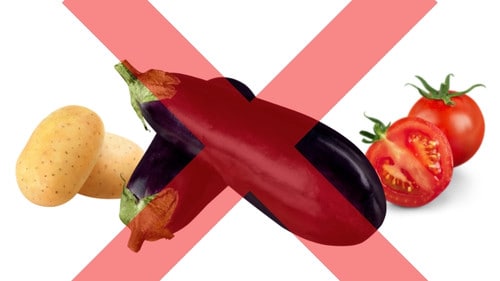
The leaves of nightshade plants – that is, potatoes, tomatoes, eggplants, and wild nightshade– contain an alkaloid toxin called solanine, and should never be fed to rabbits. This toxin can also be found in green potatoes.
Wild nightshade is a common garden weed and produces berries with a high solanine content. These are poisonous to both rabbits and humans.
As far as domesticated nightshades, a few bites of a white potato or red tomato probably won’t hurt your bunny. But these foods are high in carbohydrates and are better avoided anyway. Green bell pepper fruits are safe for rabbits.
7. Corn

Whether dried on the husk or fresh and sweet, rabbits should never eat corn. The primary carbohydrate in corn is a complex polysaccharide that rabbits aren’t equipped to digest at all. Undigested corn can cause blockage and GI stasis, besides the fact that it offers no significant nutritional value.
8. Fruit Seeds and Pits
You can treat your rabbit to small pieces of mangoes, cherries, peaches and other stone fruits – but when you do, take care to remove the entire seed or pit! The same goes for apple and pear seeds; these all contain trace amounts of cyanide.
It may not be enough to cause serious harm to your rabbit, but it’s not worth the risk.
9. Chocolate

Chocolate is poisonous for rabbits, even in small amounts. Rabbits have no pathways to deal with the compounds theobromine and caffeine found in chocolate.
Bunnies will develop an elevated heart rate and potentially life-threatening diarrhea if they consume chocolate, cocoa, or coffee in any form.
10. Peanuts, Walnuts, and Other Nuts

Rabbits can eat small amounts of peanuts, walnuts, and most other nuts without immediate negative effects. But these foods are pretty far off target when it comes to a rabbit’s nutritional needs. Bunnies need a high fiber diet with lots of vitamins and minerals, but nuts contain mostly fat and protein.
11. Yogurt Drops
Pet stores market yogurt drops as treats for rabbits, but they aren’t healthy and can even be dangerous.
The top three ingredients in yogurt drops are sugar, vegetable oil, and whey powder – three ingredients that are virtually nonexistent in a rabbit’s natural diet! Yogurt drops can cause an overgrowth of “bad” bacteria in the GI tract, leading to fatal enterotoxemia.
12. Grains (Oatmeal, Barley, Rice)

Rabbits can digest grains, but these high-starch foods have no useful purpose in a rabbit’s diet. Regularly feeding your rabbit oats, barley, or other grains will put it at risk of obesity, nutritional deficiencies and dysbiosis – that is, an imbalanced gut microbiome.
13. Cereal, Crackers, Cookies, and Processed Foods

Your bunny may have a sweet tooth and beg for a bite of your cracker, but for her sake, resist the temptation to share. Heavily processed, high-carbohydrate foods can shock your rabbit’s gut and spoil your bunny’s appetite for healthy treats.
14. Rabbit Muesli Mix and Cheap Pellets
Many brands of bagged rabbit food have shockingly bad ingredients. Commercial pellets often contain more soy and wheat middlings than timothy or alfalfa! Muesli mixes for rabbits don’t provide the fiber necessary to maintain healthy tooth alignment and GI tract function.
15. Houseplants
While you may not think of the peace lily sitting on your end table as a “food,” your rabbit might! Curious rabbits may take a bite out of your houseplants as they play and investigate. Quite a few common houseplants are poisonous to rabbits and other pets, including snake plant, ivy, and aloe vera.
16. Wild Plants and Ornamental Flowers
Many wild or cultivated plants and flowers are toxic to rabbits, including foxglove, columbine, hyacinth, buttercup, and yew.
In general, it’s best to leave wild plants in your yard and not pick them for your rabbits to eat. If you do decide to forage for your bunny, make 100% sure you’ve properly identified the plant and that it’s safe for rabbits to eat.
You should also make sure that the plants you forage have not been sprayed with pesticides, herbicides, or chemicals of any kind. Rabbits are very sensitive to these chemicals.
17. Toxic Herbs
While many herbs are safe for rabbits, some are dangerous in small quantities, and others should only be fed in moderate amounts. Herbs that are high in oxalic acid and calcium, like parsley, can contribute to bladder stones. Herbs that are outright poisonous include comfrey, ragwort, and chives.
18. Dairy, Meat, Eggs and Animal Products
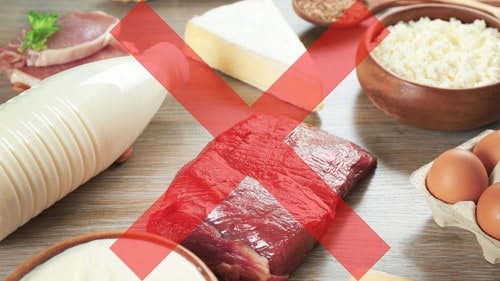
Rabbits are vegetarians; animal products such as dairy (milk), meat, and eggs have no place in their diets. Rabbits will usually turn up their noses at these foods anyway. But if your bunny is begging to sample your cheese or yogurt, gently tell him no.
Vegetables to Feed Rabbits with Caution
As you’ve probably gathered from reading our list of foods rabbits can’t eat, the vast majority of a rabbit’s diet should be hay and fresh vegetables. Most fruits and leafy veggies are safe for rabbits to eat in some form, but there are a few categories that you should approach with caution.
Cauliflower, Cabbage and Kale
Brassicas such as cauliflower, cabbage, kale, and broccoli crowns are high in oxalates, which, if there’s not enough fiber in the diet, can cause a buildup of gas bubbles known as bloat. Bloat is not just painful for rabbits to experience; it can quickly become a medical emergency.
Some brassicas (especially kale) also contain high levels of calcium. Some rabbits are prone to bladder sludge (high levels of calcium in their urine) and bladder stones. Sticking to a lower-calcium diet can help resolve this issue.
Some rabbit rescues report feeding their rabbits moderate amounts of kale, cabbage, or broccoli without problems, but you should discuss the needs of your individual rabbit with your veterinarian and make an informed choice about whether or not to feed these vegetables.
Starchy Vegetables, e.g. Carrots, Beets, and Pea Pods
Did you know that there’s 4.7 grams of sugar in 100 grams of carrot? There’s even more sugar (7 grams) in 100 grams of beets.
While we think of these foods as healthy, we need to remember that for rabbits, starchy veggies should be treats instead of dietary staples. A one-inch sized cube of carrot is all a bunny needs to satisfy his sweet tooth.
High-Sugar Fruits, e.g. Banana, Mango, Grapes, Oranges
Unlike dogs and some other pets, rabbits can eat oranges, grapes, and raisins. Grapes and raisins are not toxic to rabbits. But these fruits, along with others like banana and mango, are very high in sugar.
Not only is the overall sugar content high in fruit, but the type of sugar makes a difference in how well a rabbit can digest these foods. Fruits are high in fructose, a type of sugar that a rabbit’s digestive system doesn’t usually encounter in the wild.
If you give your rabbits high-fructose fruit as a treat, only offer a teaspoon-sized serving, no matter how he begs for more. This is especially important if it’s the first time your bunny has ever had that particular food. Offering too much too quickly can cause fatal enterotoxemia.
What Should a Rabbit Eat?
Rabbits are strict herbivores – meaning they eat only plants. Healthy rabbits have a GI tract filled with microflora that’s ready to ferment and digest one particular type of vegetation: high-fiber grass hay.
The macronutrients in a pet rabbit’s diet should be at least 20% fiber, 10-15% protein, and less than 2.5% fat. Carbohydrates and sugars have very little place in a rabbit’s diet.
A nutritious daily diet for a rabbit looks like this:
- 85% grass hay
- 10% nutrient-dense low-carb vegetables
- 4% healthy pellets
- 1% safe treats
Our article on “What should a rabbit eat?” has detailed, vet-approved guidance on how to choose the healthiest food for your rabbit.
Frequently Asked Questions
What foods are toxic to rabbits?
Foods that are toxic to rabbits include avocado, rhubarb, onions, garlic, leeks, broad beans, kidney beans, chocolate, and coffee. Common garden plants that are toxic include lilies, tulips, periwinkle, ivy, nightshade, and delphinium.
Are rabbits vegetarian?
Yes, rabbits are strict vegetarians; you could even call them vegans! Rabbits should eat all plants and only plants – no meat, eggs, milk or dairy products.
What vegetables are harmful to rabbits?
Most vegetables are healthy for rabbits, but there are a few exceptions. Iceberg lettuce and other light-colored lettuces are not good for rabbits.
High calcium vegetables like kale, spinach, and collard greens may exacerbate urinary problems in bunnies.
Starchy vegetables such as carrot, parsnip, and sweet potato should be fed only as treats because of their high sugar content.
What foods are rabbits allergic to?
Individual rabbits may be intolerant to specific foods. However, the only foods that commonly cause allergic reactions in rabbits are vegetables in the allium family: onion, garlic, chives, scallions, shallots, and leeks.
In Conclusion
Rabbits of different ages and lifestyles have different nutritional requirements, but there are a handful of foods that are harmful for rabbits no matter what the other circumstances.
Familiarize yourself with this list of foods that are toxic or not-very-healthy for rabbits, and share it with your family members. Take a look in the bottom shelf of your pantry to make sure that there are no unhealthy foods within your rabbits’ reach.
Focus on feeding your bunny high-quality hay and nutrient-dense vegetables. And if you want to share a snack with your bunny, don’t give him a nibble of your cookie; split a cucumber with him instead.


